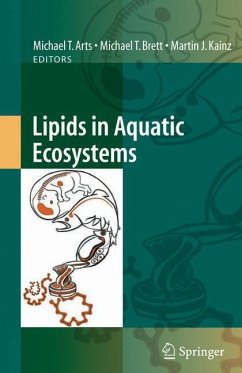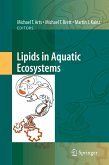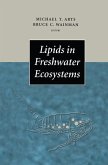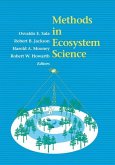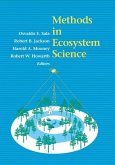Evidence now suggests that the roles of essential fatty acids as growth promoters and as indices of health and nutrition are fundamentally similar in freshwater and marine ecosystems. Lipids in Aquatic Ecosystems integrates this divergent literature into a coordinated, digestible form.
Chapters are organized so as to discuss and synthesize the flow of lipids from lower to higher trophic levels, up to and including humans. Linkages between the production, distribution and pathways of these essential compounds within the various levels of the aquatic food webs, and their ultimate uptake by humans and other terrestrial organisms, are highlighted throughout the book. This book will be of interest to researchers and resource managers working with aquatic ecosystems.
Chapters are organized so as to discuss and synthesize the flow of lipids from lower to higher trophic levels, up to and including humans. Linkages between the production, distribution and pathways of these essential compounds within the various levels of the aquatic food webs, and their ultimate uptake by humans and other terrestrial organisms, are highlighted throughout the book. This book will be of interest to researchers and resource managers working with aquatic ecosystems.
From the reviews:
"The book ... cover the role of lipids from lower to higher trophic levels. ... Each chapter starts with a well-drafted introduction to the topic, and finishes with a conclusion that opens the door for future research in the field. ... this book should appeal to plankton ecologists, nutritionists, aquaculturists, toxicologists, environmental chemists and environmental managers. I would add that it should also appeal to lipid educators ... . easy to read volume that should be in the shelves of most lipid chemists' libraries." (Néstor M. Carballeira, Lipids, Vol. 44, 2009)
"The chapters of the book progress logically through the origins of lipids in aquatic environments ... . Lipids derived from aquatic ecosystems are vitally important for human health and the chapter detailing these issues will provide a useful justification for funding from grant awarding bodies. Overall, the book with its extensive summary of the current literature is essential reading for researchers with an interest in the ecological biochemistry of aquatic organisms and will provide an invaluable baseline for future studies in this field." (D. W. Pond, Journal of Plankton Research, October, 2009)
"It is a very good attempt to provide an update on the role of lipids in the growth and reproduction of organisms in aquatic environments in general. ... The book broadly sums up the recent literature on the role of lipids in different types of aquatic systems. ... The present book has an extended scope because it includes studies on lipids in both freshwater and marine ecosystems. ... I enjoyed every bit of reading the book ... ." (Ramesh D. Gulati, Aquatic Ecology, Vol. 43, 2009) "This new book is an attempt to establish a general reference for all aquatic systems and covers a wide range of topics ... . The book is intended for a large audience: academics and graduate students, but also government researchers and resource managers. ... will be extremely useful for students and all researchers in need of a good introduction but also in need of clarifications on the possibilities and limitations of the different approaches one might consider. ... also appeal to readers from related disciplines." (Patrick Mayzaud, Limnology and Oceanography Bulletin, Vol. 18 (4), December, 2009)
"The book ... cover the role of lipids from lower to higher trophic levels. ... Each chapter starts with a well-drafted introduction to the topic, and finishes with a conclusion that opens the door for future research in the field. ... this book should appeal to plankton ecologists, nutritionists, aquaculturists, toxicologists, environmental chemists and environmental managers. I would add that it should also appeal to lipid educators ... . easy to read volume that should be in the shelves of most lipid chemists' libraries." (Néstor M. Carballeira, Lipids, Vol. 44, 2009)
"The chapters of the book progress logically through the origins of lipids in aquatic environments ... . Lipids derived from aquatic ecosystems are vitally important for human health and the chapter detailing these issues will provide a useful justification for funding from grant awarding bodies. Overall, the book with its extensive summary of the current literature is essential reading for researchers with an interest in the ecological biochemistry of aquatic organisms and will provide an invaluable baseline for future studies in this field." (D. W. Pond, Journal of Plankton Research, October, 2009)
"It is a very good attempt to provide an update on the role of lipids in the growth and reproduction of organisms in aquatic environments in general. ... The book broadly sums up the recent literature on the role of lipids in different types of aquatic systems. ... The present book has an extended scope because it includes studies on lipids in both freshwater and marine ecosystems. ... I enjoyed every bit of reading the book ... ." (Ramesh D. Gulati, Aquatic Ecology, Vol. 43, 2009) "This new book is an attempt to establish a general reference for all aquatic systems and covers a wide range of topics ... . The book is intended for a large audience: academics and graduate students, but also government researchers and resource managers. ... will be extremely useful for students and all researchers in need of a good introduction but also in need of clarifications on the possibilities and limitations of the different approaches one might consider. ... also appeal to readers from related disciplines." (Patrick Mayzaud, Limnology and Oceanography Bulletin, Vol. 18 (4), December, 2009)

